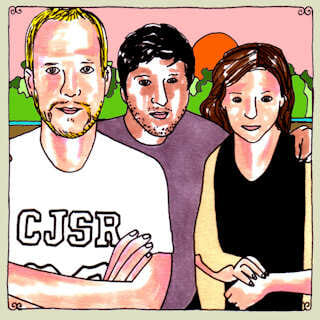- Welcome to Daytrotter
- The Air
- Two Lovers
- In The Summertime
- Barnesyard
One of the morning rituals around our house is my daughter’s call for movies and the movie of the moment, thanks to Netflix, is “Mary Poppins.” And so it happens every a.m. that the chimney sweeps and the contagious laughs of Uncle Albert provide the entertainment. One character in particular, my daughter seems to misjudge. It’s Admiral Boom, the old seafarer fixated on precise time and logging the whereabouts of his neighborhood. He barks out orders, calls down to passerby, warns of heavy weather a-brewin’ and makes sure that no one sleeps through beautiful mornings, packing his cannon with a double-charge of powder. He’s louder, but only to be heard from four floors above the street level. My daughter, upon his sight, exclaims in a low voice, “He’s mad.” Referring to madness that could get someone institutionalized, she may have a point, but what she’s really reading is the fire and piss in his booming inflections. She’d infer a similar thing about Rural Alberta Advantage lead singer Nils Edenloff, who puts his back and his over-sized heart into everything he sings on the groups incredibly affecting Saddle Creek debut, “Hometowns,” a rip through the thoughts and suspended lives that get captured on film and photographic papers, then stored away in a shoebox somewhere in an attic with the cobwebs and the occasional family of mice. He writes songs about the dead, for the living, as if to slap them broadly across the unsuspecting cheeks to remind them that they’re still able to wake up in the mornings and that alone is a very fine thing, an advantage that allows for feeling the blood go through you, for feeling the pain course (not always so horrible) and for feeling any kind of feeling you’d please or wouldn’t please. The option is exhilarating and Edenloff, Paul Banwatt and Amy Cole make it feel as if this shouldn’t be an option, but the greatest need – to see the extent of what your muscles and tissues can accomplish day-in and day-out, giving them workout after workout. The themes of “Hometowns” are dedicated to all of things that will pass and “the good things that will last,” to the very luxurious thought that some of this stuff that we do with and to each other is permanent and will carry on even without us to promote it, to keep pushing it. Impressions are made enough to let them lingering long after death – love can endure and history can endure with it. People can hold onto one another even without bodies to grip, torsos to cling to. Faces can be recalled in high definition and old loves don’t need to be dusted for, really. They’re still here, with their distinct handprints all over the counters and hanging oily upon our particular skin. The Rural Alberta Advantage, emote urgently, with a fevered pitch, offering us visits to graveyards, to visit the plots where the tombstones are familiar, with our family’s names carved into them. They take us to where our grandfather’s underground, in the cold, cold dirt. The dead are still there, Edenloff seems to remind us – we know where to find them and they’re still relatively tangible beings, possibly looking up at us through the casket door and closed eyelids, or from whichever point they now occupy. They are looks that can convey but one thing: you aren’t a corpse yet so get to it. Rural Alberta Orchestra make these moving canvases of desperate and daring people, at once resigned to the plights they’ve lucked into, and still insistent that it can all be meaningful, that living isn’t done just for one, but for many. The prairies and broken towns that they’ve settled in or been born into through no choice of their own are just the settings, but the plots and the lights can be as bright as they make them and it’s for this that Edenloff sounds like a mad man.
